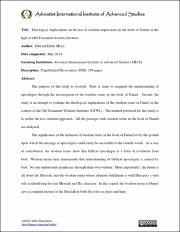| dc.contributor.author | Moyo, Edward Eddie | |
| dc.date.accessioned | 2021-05-25T01:19:34Z | |
| dc.date.available | 2021-05-25T01:19:34Z | |
| dc.date.issued | 2014-05 | |
| dc.identifier.uri | https://dspace.aiias.edu/xmlui/handle/20.500.12977/402 | |
| dc.description | Unpublished Dissertation (PhD Religion)
Shelf Location: BS1556 .M69 2014 ATDC | en_US |
| dc.description.abstract | The purpose of this study is twofold. First, it seeks to augment the understanding of
apocalypse through the investigation of the wisdom terms in the book of Daniel. Second, the
study is an attempt to evaluate the theological implications of the wisdom terms in Daniel in the
context of the Old Testament Wisdom literature (OTWL). The method preferred for this study is
to utilize the text-centered approach. All the passages with wisdom terms in the book of Daniel
are analyzed.
The significance of the inclusion of wisdom terms in the book of Daniel levels the ground
upon which the message of apocalypse could easily be accessible to the Gentile world. As a way
of contribution, the wisdom terms show that biblical apocalypse is a form of revelation from
God. Wisdom terms here demonstrate that understanding of biblical apocalypse is caused by
God. No one understands prophecies through their own wisdom. More importantly, the future is
all about the Messiah, and the wisdom terms whose ultimate fulfillment is with Him play a vital
role in identifying the true Messiah and His character. In this regard, the wisdom terms in Daniel
give a complete picture of the Messiah in both His roles as priest and king. | en_US |
| dc.language.iso | en_US | en_US |
| dc.publisher | Adventist International Institute of Advanced Studies | en_US |
| dc.title | Theological implications on the use of wisdom expressions in the book of Daniel in the light of Old Testament Wisdom Literature | en_US |
| dc.type | Dissertation | en_US |

